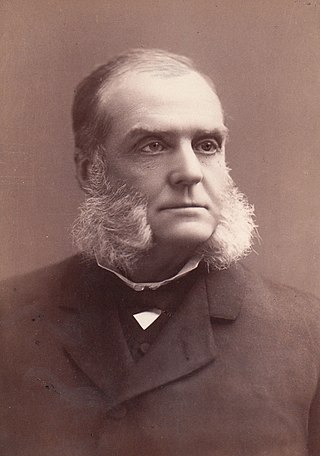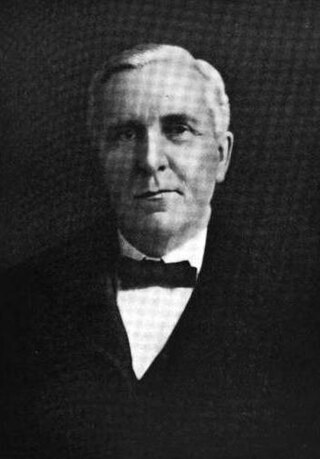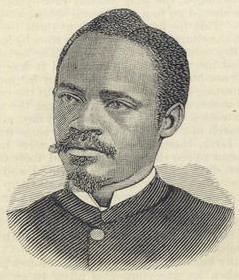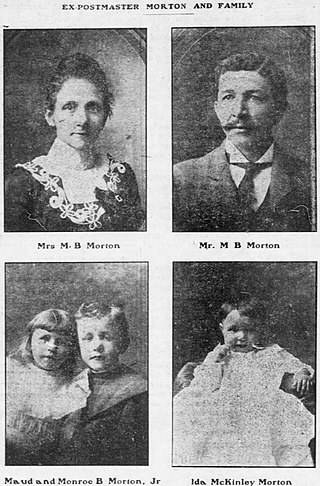
Morehouse College is a private historically Black, men's, liberal arts college in Atlanta, Georgia. Anchored by its main campus of 61 acres (25 ha) near Downtown Atlanta, the college has a variety of residential dorms and academic buildings east of Ashview Heights. Along with Spelman College, Clark Atlanta University, and the Morehouse School of Medicine, the college is a member of the Atlanta University Center consortium.

Lot Myrick Morrill was an American politician who served as the 28th governor of Maine, as a United States senator, and as U.S. secretary of the treasury under President Ulysses S. Grant. An advocate for hard currency rather than paper money, Morrill was popularly received as treasury secretary by the American press and Wall Street. He was known for financial and political integrity, and was said to be focused on serving the public good rather than party interests. Morrill was President Grant's fourth and last Secretary of the Treasury.

Horace Julian Bond was an American social activist, leader of the civil rights movement, politician, professor, and writer. While he was a student at Morehouse College in Atlanta, Georgia, during the early 1960s, he helped establish the Student Nonviolent Coordinating Committee (SNCC). In 1971, he co-founded the Southern Poverty Law Center in Montgomery, Alabama, and served as its first president for nearly a decade.

Francis Preston Blair Jr. was a United States Senator, a United States Congressman and a Union Major General during the Civil War. He represented Missouri in both the House of Representatives and the Senate, and was active in preventing the State of Missouri from being absorbed into the Confederacy at the beginning of the Civil War.

Charles James Folger was an American lawyer and politician. A member of the Republican Party, he was a State Senator in New York from 1862 to 1869 and served as the 34th U.S. Secretary of the Treasury from November 14th, 1881 until his death in 1884. Folger was the Republican nominee for Governor of New York in 1882, but was defeated by the Democratic Party's nominee, future President Grover Cleveland.

John Hope, born in Augusta, Georgia, was an American educator and political activist, the first African-descended president of both Morehouse College in 1906 and of Atlanta University in 1929, where he worked to develop graduate programs. Both are historically Black colleges.
The American Baptist Home Mission Society is a Christian missionary society. Its main predecessor the Home Mission Society was established in New York City in 1832 to operate in the American frontier, with the stated mission "to preach the Gospel, establish churches and give support and ministry to the unchurched and destitute." In the 19th century, the Society was related to the Triennial Convention of Baptists. Today it is part of that Convention's successor, the American Baptist Churches, USA, and is the successor by merger of several 19th century Baptist organizations related to missions and education, including publications (1824), women (1877), and education (1888)

Channing Heggie Tobias was a civil rights activist and 1948 Spingarn Medalist. In 1946 he was appointed to the President's Committee on Civil Rights. He has been called "the Booker T. Washington of his day".

Isaac Newton Arnold was an American attorney, politician, and biographer who made his career in Chicago. He served two terms in the United States House of Representatives (1860–1864) and in 1864 introduced the first resolution in Congress proposing a constitutional amendment to abolish slavery in the United States. After returning to Chicago in 1866, he practiced law and wrote biographies of Abraham Lincoln and Benedict Arnold.

Charles Henry Prince was a U.S. Representative from Georgia.
Norwood Bowne was an American newspaper editor and politician from New York.

Henry Lincoln Johnson was an American attorney and politician from the state of Georgia. He is best remembered as one of the most prominent African-American Republicans of the first two decades of the 20th century and as a leader of the dominant black-and-tan faction of the Republican Party of Georgia. He was appointed by President William Howard Taft as Recorder of Deeds for the District of Columbia, at the time regarded as the premier political patronage position reserved for black Americans, and one of four appointees known as Taft's "Black Cabinet".

Emanuel K. Love was a minister and leader in the Baptist church from Savannah, Georgia. He was pastor of one of the largest churches in the country and was a prominent activist for black civil rights and anti-lynching laws. He played an important role in establishing separate black Baptist national organizations and advocating for black leadership of Baptist institutions, especially schools.

William Jefferson White was an American civil rights leader, minister, educator, and journalist. He was the founder of Harmony Baptist Church in Augusta, Georgia, in 1869, and of other churches. In 1867 he helped found the Augusta Institute, which became Morehouse College; he also helped found Atlanta University and was a trustee of both schools. He was a founder in 1880 and the managing editor of the Georgia Baptist, a leading African American newspaper for many years. He was an outspoken civil-rights leader.

Monroe Bowers Morton, nicknamed Pink Morton was a prominent building owner, publisher, building contractor, developer, and postmaster in late 19th-century Georgia. An African American, he lived most of his life in Athens, Georgia, where he published a newspaper and built the Morton Building. The building included the Morton Theatre on its upper floors, a vaudeville venue, and offices for African-American professionals including doctors and druggists (pharmacists) on its ground floor. Occupants included Dr. Ida Mae Johnson Hiram, the first Black woman to be licensed to practice medicine (dentistry) in the state, and Dr. William H. Harris, one of the founders of the Georgia State Medical Association of Colored Physicians, Dentists and Druggists.

Henry Allen Rucker was an African American entrepreneur and politician. He was born into slavery. A good mother was credited for helping him achieve success as he was, “like steel” tempered amidst the “awful crucible of prejudice and proscription” in the American South.

Georgianna Eliza Hopley (1858–1944) was an American journalist, political figure, and temperance advocate. A member of a prominent Ohio publishing family, she was the first woman reporter in Columbus, and editor of several publications. She served as a correspondent and representative at the 1900 Paris Exposition and the 1901 Pan-American Exposition. She was active in state and national politics, serving as vice-president of the Woman's Republican Club of Ohio and directing publicity for Warren G. Harding's presidential campaign.
John Hill Morgan was an American lawyer, politician, and art expert.

Styles Linton Hutchins was an attorney, politician, and activist in South Carolina, Georgia, and Tennessee between 1877 and 1906. Hutchins was among the last African Americans to graduate from the University of South Carolina School of Law in the brief window during Reconstruction when the school was open to Black students and the first Black attorney admitted to practice in Georgia. He practiced law and participated in Georgia and Tennessee politics. He served a single term (1887-1888) in the Tennessee General Assembly as one of its last Black members before an era of entrenched white supremacist policies that lasted until 1965, and advocated for the interests of African Americans. He called for reparations and attempted to identify or create a separate homeland for Blacks. He was a member of the defense team in the 1906 appeal on civil rights grounds by Ed Johnson of a conviction of rape, a case which reached the Supreme Court before it was halted by Johnson's murder by lynching in Chattanooga, Tennessee.
















